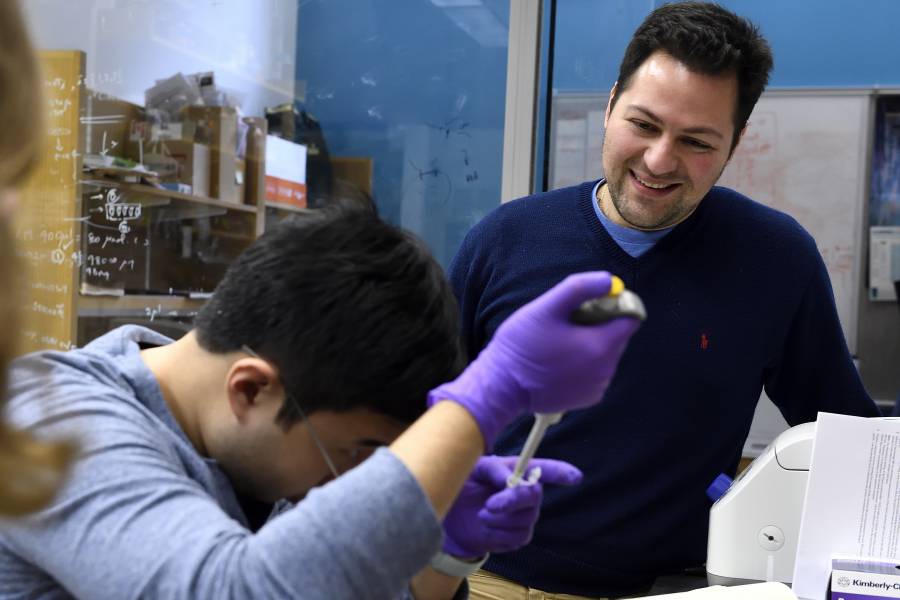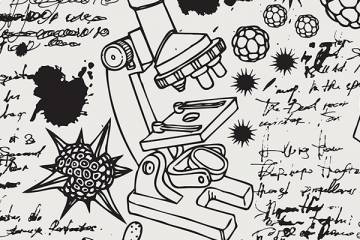Proteins must fold themselves up into specific three-dimensional shapes to perform tasks required by the cell for function and survival. But when proteins fold into the wrong shape, they aggregate or clump together—think of the way eggs transform from liquid to solid during the cooking process.
Misfolded proteins can disrupt the normal functioning of the cell, and are associated with a wide range of diseases. When the proteins inside neurons aggregate, the toxic structures they create cause neurodegenerative diseases like Alzheimer's and Parkinson's. "Over billions of years of evolution, cells were challenged with the task to get their proteins to fold up correctly and stay that way," says Stephen Fried, assistant professor in the Department of Chemistry in the Krieger School of Arts and Sciences. "But we humans live for a pretty long time, and as the proteins in our brains get older, there seems to be a slow process where they forget what shape they're supposed to be in. They form structures that stick to each other, ultimately leading to the death of neurons, dementia, and other maladies associated with age."
Fried has received an NIH Director's New Innovator Award from the National Institutes of Health's High-Risk, High-Reward Research program to continue his studies into both the normal process of protein folding and what happens on a molecular level when the process goes awry. The award, in the amount of $1.5 million over five years, supports unusually innovative research from early career investigators.
"The breadth of innovative science put forth by the 2020 cohort of early career and seasoned investigators is impressive and inspiring," said NIH Director Francis S. Collins. "I am confident that their work will propel biomedical and behavioral research and lead to improvements in human health."
Scientists have been trying to understand the folding process for some time by studying purified proteins in test tubes. What sets Fried's research apart is that he and his team are studying the normal and abnormal folding of proteins in their native context—in this case, within rodent brains.
"We think that the tools we're developing on the front part of our project will give us a new view into why cells are so good at getting their proteins to assemble into such complicated and intricate architectures," Fried says. "We will then apply the tools to take a look at what's going on inside rats' brains at the molecular level when they age. Specifically, we want to know what's different in cognitively healthy versus cognitively impaired rats."
Fried has been collaborating with Michela Gallagher, Krieger-Eisenhower Professor of Psychology and Neuroscience, whose long-term research on Alzheimer's-related changes within the brain has produced experimental drugs now in clinical trials. While Gallagher's team focuses on the brain's structures, Fried's team complements the research by working at the molecular level. "Our collaboration will zoom in on the proteins forming incorrect shapes inside the brain; what they are interacting with, and what shapes they are forming," Fried says.
It is the opportunity for such interdisciplinary work that made the NIH award possible, Fried says, pointing to the preliminary data he and Gallagher were able to produce that he believes convinced the reviewers to take a chance on this uncharted territory.
Jotham Suez, a postdoctoral fellow at the Weizmann Institute of Science and is expected to join the Johns Hopkins Bloomberg School of Public Health as an assistant professor in the Department of Molecular Microbiology and Immunology in January, was also awarded an Early Independence Award from the High-Risk, High-Reward Research program. A microbiologist, Suez focuses on how non-nutritive sweeteners affect microbiomes. His early research indicated that non-caloric sweeteners can negatively affect health through the disruption of gut bacteria, and his research at JHU will focus on deciphering the underlying mechanisms.
The High-Risk, High-Reward Research program catalyzes scientific discovery by supporting research proposals that, due to their inherent risk, may struggle in the traditional peer-review process despite their transformative potential. Program applicants are encouraged to think "outside the box" and to pursue trailblazing ideas in any area of research relevant to the NIH's mission to advance knowledge and enhance health.
Posted in Science+Technology, University News
Tagged faculty news









